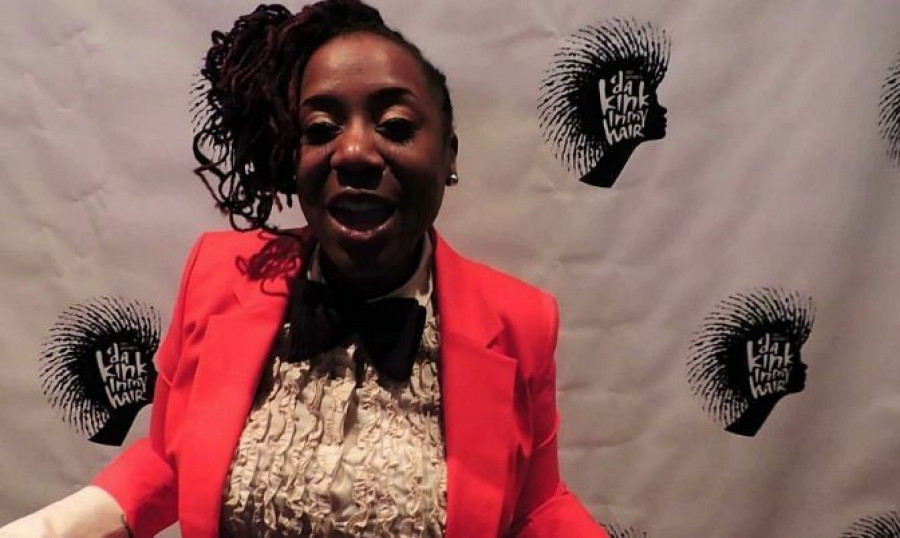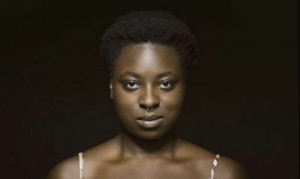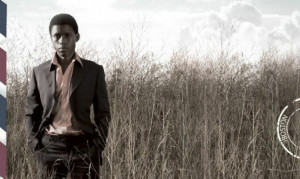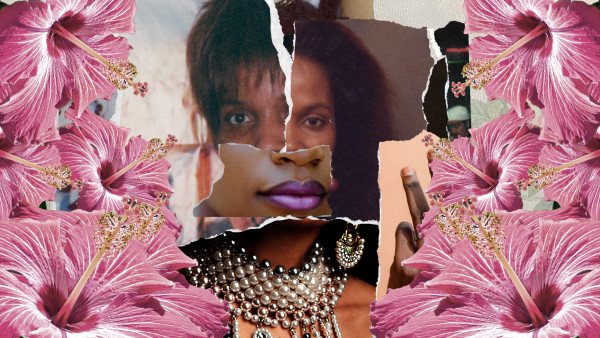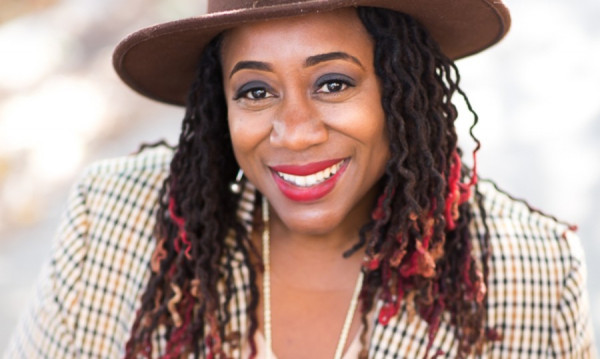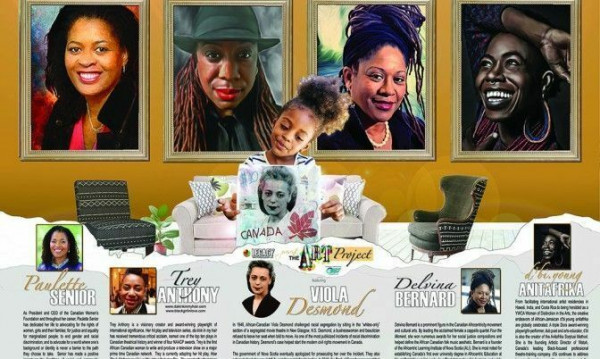‘Da Kink in My Hair is a must-see, award-winning play that gives voice to the unique struggles of Black women. It’s about so much more than hair — it touches on issues of racism, shade-ism, motherhood, body image, sexuality, and many more.
This version of the play includes some new monologues and scenes, intertwined with music and movement. Creator and director Trey Anthony has decided to bring the play on a cross Canada tour, she talked to us about going North, and one of her greatest fears.
Tell us about ‘da Kink in My Hair and what’s new or different in this revival of the play?
This version of ‘da Kink is a back-to-its-roots version/ Over the years, ‘da Kink has evolved into different versions of the show. Sometimes it’s been a big musical, sometimes it had really big sets, and big costumes. This time, because it’s a touring production and also for my own self, I really wanted to get back to very simplistic sets and let the monologues speak for themselves and so, it’s a very raw show. I’ve added a few new monologues, some new scene transitions, and some various different scenes. It’s a very simple cast — just 4 people. It’s a very strong, dynamic show and it talks about the lives of Black women and everything that we go through.
One of the things that has been really important to me is to make sure that every woman who’s sitting in the audience sees herself reflected in one of the monologues.
What kind of issues does the play tackle and why did you decide to write about these issues?
It covers a wide range of issues for women. We talk about body image with women, there’s another monologue on shade-ism within the Black community, the whole thing with the good hair/bad hair dilemma that a lot of us face, there’s a monologue dealing with the Black super-strong woman, one dealing with sexuality, sexual abuse, police brutality.
So, it really digs into a lot of really deep and complex issues that, usually, I feel we don’t talk about in public spaces but need to be talked about. That, for me, was just really important because I think a lot of times, especially with Black women, we see ourselves very much portrayed in the media in very stereotypical roles. I wanted to have really layered, complex characters and have us being in loverships, being in love, and experiencing different issues with our families. I just wanted to show us in real life, everyday situations and how we handle things.
Why did you decide to bring the play on a cross Canada tour?
We got the offer from the NACC [Northern Arts and Cultural Centre] in Yellowknife and at that point, I was just going to do one show. But they started actually booking the show in these various communities and they really were very adamant about making sure outreach was done to remote communities and Aboriginal communities who are facing very similar issues to the Black community. And so, I was very intrigued by that — about being able to do this work in communities that usually wouldn't have access to this work and for me, as an artist, that was really important.
After that, once we started booking those dates, I started looking at other places that ‘da Kink hadn't gone to and I just decided, okay, why don't we put Ottawa on the map? Then, of course, a lot of the actors are from Toronto, so they said we can’t do the show and not have a production here in Toronto. So, I decided to do it on the border of Mississauga/Toronto because I also thought it was important to do it outside of Toronto just for a bit, so other communities could come and see it as well.
They were communities that I, myself, don’t think I would have considered or even think that they would be interested in seeing the show and, yet the show in Yellowknife, for example, has been sold out for a week before we’ve even opened and that made me surprised. I think that sometimes as Torontonians, we’re a bit guilty of that. We kind of feel like our stories are just our stories and we can’t imagine that it can actually cross over and so, I think it was just really that the seed was planted for me, which I don’t think I would have planted on my own. Once the suggestion [of Northern Canada] was made, I wondered why I didn’t think of it myself, but I really didn’t.
And the other thing too: I’m deathly afraid of cold, so everyone who knows me is really laughing that I’m going to Northern Canada because I detest the winters here and, now, I’m actually going to the coldest part of Canada. The irony is not lost. I just kind of went around and picked up Sorel boots and got a Canada Goose coat because I’m just so deathly afraid of being cold while I’m up there.
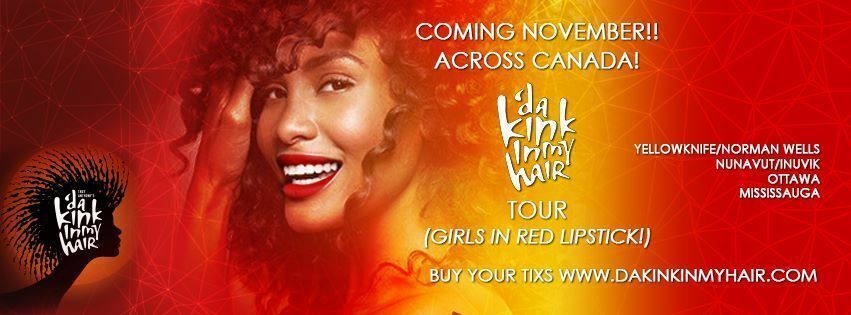
Which character do you think is the most interesting?
That’s really hard! I think that’s like asking a mother, “Which one is your favourite child?”
I think they’re all very unique for various reasons; I really couldn't pick which one is the most interesting character because I think each character speaks to various experiences in my own life and life stories that I’ve heard from various family members and friends. I think because the actors do such a great job portraying the characters, I would be really hard-pressed to say which one is the most interesting. I think they all are — I think they’re all intriguing. They all are stories that need to be told and voices that need to be heard.
Why do you think that ‘da Kink in My Hair has resonated so well with the Black community — more specifically Black women?
I think for us, we come from a community where we are taught — a lot of us are taught — that there are certain things that you don't talk about. There’s very much the public and private persona and I think that especially with Black women, when we’re seeing ourselves on TV it usually is, as I call them, the “fried chicken-eating” characters or the bossy Black best friend, and we never get to evolve from those characters. It’s very, very limited. Thank God, now we have shows like How to Get Away with Murder and Scandal, but I think when ‘da Kink came out many years ago we didn't have the Olivia Popes on TV and we didn't have a Viola Davis and even now, we can only point out one or two women and I think that’s very sad.
It resonated with Black women because we weren’t used to seeing ourselves on stage talking about our mothers, talking about our love, talking about work pressures, talking about issues with our hair and just being really rounded or authentic characters.
Women were weeping in the audiences and crying because we were so hungry to see ourselves. I think for a lot of women, we didn't recognize how hungry we were to see ourselves until ‘da Kink came because I have women now buying tickets for ‘da Kink who have seen it four or five times and they still want to come and see it again or they’re bringing their daughters or their nieces. So, I think it’s one of those plays that is very timely and also timeless in the sense that issues that we talked about 15 years ago are still very relevant to Black women, especially now.
Even just Viola Davis’s speech, when she said that you can’t win an Emmy for roles that are not there. I see that even with ‘da Kink that so many women want to do these roles because there’s no roles out there that give them the kind of opportunity to be able to portray the range of acting skills that are required for this piece. So, a lot of the actors that are in this piece talk about this being a lifetime opportunity to be able to do this work, which has such meaning and value.
Why do you think that, we, as Black women are so emotionally tied to our hair?
The hair in ‘da Kink is very symbolic of the journey that we go through and there’s a line in the play that says, “If you want to know a Black woman, you touch her hair… that is where we carry everything — all our hopes, our dreams, our pain”.
And I think for Black women, especially, because we do so many things to our hair and I think it’s very symbolic of our lives — things that are good, things that are sometimes not great for our hair. I know, for me, my hair is always a representation of where I am in my life. Right now, I have ‘locs and anytime I feel that I’m taking care of myself, my ‘locs usually look really well done and they’re conditioned but anytime I’m working way too hard or feeling stressed out, my hair starts to feel brittle and it’s not looking on point as it usually does. Our hair is really a true reflection of what’s going on in our lives. I think that as women, in general, you know that if your hair is looking good and then there are days that it doesn’t or when you’re having a bad hair day, it can mess up your whole day.
With us, we have a very complex relationship with our hair. So, I feel for me to talk about ‘da Kink in My Hair, I wanted that when Black women even saw the title of the play, they were like, “Okay, this a play for me. Finally! Because I want to talk about the issues of my hair”. And, it’s not just a play that talks about issues of our hair, but it talks about the whole journey of us, as Black women.
What should audiences expect from ‘da Kink in My Hair?
We did a dress rehearsal just this week, where we invited and selected people from the industry and the community. And what they said was that it really is a rollercoaster of emotions — one minute you’re laughing, then you’re crying, then you’re sighing, and then you’re saying “you go girl!”, then there are times that you’re just left breathless and speechless.
Then, the other thing which I really loved is that people said they felt very healed by the piece and that they felt that they were a part of this women’s community that they never felt a part of before. That’s what audiences mutually experience with ‘da Kink. It’s a very healing piece and a very raw emotion piece; you can’t look away. You can’t walk out of that play without feeling changed in some way.
‘da Kink in My Hair will be touring in the following cities: Yellowknife (November 14), Norman Wells (November 16), Inuvik (November 18), Ottawa (November 21), and Mississauga (November 28).
For all the updates follow ‘da Kink in My Hair on Facebook and on Twitter. You can follow Trey Anthony on Facebook and Twitter.
